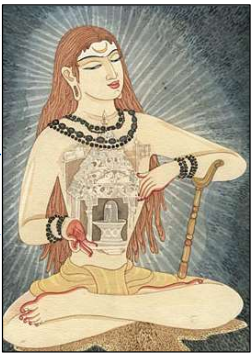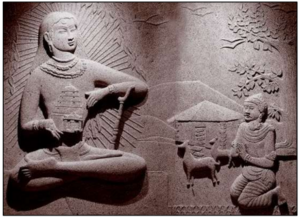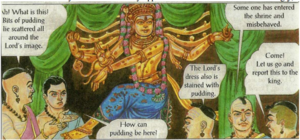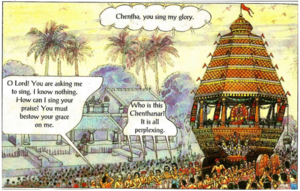Talk:Wealth
By Vishal Agarwal
The performance of yajñas requires material resources. The pursuit of jñāna-yog and dhyāna-yog is somewhat elitist because the poor do not have the wherewithal to practice these two paths. But bhakti does not require one to be rich or have access to riches because it can be performed with the most elementary and common materials. Simple chanting of Divine names in one’s heart with love can suffice to please the Bhagavān.
"Whosoever offers to Me with devotion a leaf, a flower, a fruit, or water, that offering of devotion I accept from him who is of a pure heart."Gītā 9.26"
In the town of Thiruninravur in Tamil Nadu, there lived a very good man named Pūṣalar. He was a great devotee of Śiva. He decided to construct a maṇḍira to Śiva and went around asking for donations. But he was not able to get enough money from people. Therefore, he decided to construct a temple in his own heart.
He spoke to architects and made a list of all the materials that were needed. One day, he laid the foundation of an imaginary temple in his heart. Every day, he would build a small portion of the temple in his heart, until it was finally complete. Pūṣalar then decided on an inauguration date and invited Śiva to reside in the temple of his heart.
By chance, the King had also constructed a Śiva temple in Kāñcīpuram and had chosen the same date for inauguration. Proud of his great temple, the King dreamt that night of Śiva saying, “I cannot attend your inauguration because I must go to Pūṣalar’s temple.” Shocked, the King sought out Pūṣalar and found a poor man in a hut. When Pūṣalar asked the King to place his ear on his chest, the King heard temple bells inside. Moved, the King postponed his own temple's inauguration and built a stone temple in Pūṣalar’s name, which still exists today.
When Śrī Kṛṣṇa visited Hastināpura as a peace emissary, Duryodhana invited Him to stay and dine in the royal palace. But Kṛṣṇa declined saying, “One should eat where there is love and respect.” Instead, He went to Vidura’s humble home, where He ate simple food with joy. Vidura’s love made his hospitality dearer to Kṛṣṇa than royal feasts.
In Nāmadeva kī Paracāī, Anantadāsa narrates how Sant Nāmadeva declined gold from a wealthy merchant, saying he had no use for it. Instead, he wrote "Rāma" on a tulasī leaf and weighed it against all the merchant’s gold. The leaf remained heavier. Even after offering all his wealth and puṇya, the merchant’s pan could not balance the tulasī leaf. Nāmadeva revealed that devotion is worth more than any wealth when it is born of love for Rāma.
In a story from the Maharashtrian tradition, devotees tried to match Kṛṣṇa’s weight with gold, grain, and gems, but failed. Then Rukmiṇī placed a single tulasī leaf with love on the pan, which immediately balanced the scale. This showed that love for Kṛṣṇa outweighs material gifts.
In Chidambaram, Tamil Nadu, a poor woodcutter named Centhanār offered pudding to a Śiva devotee during heavy rains, despite earning nothing. Śiva told the King in a dream, “I was not absent from your pūjā out of displeasure—I was busy eating pudding offered by Centhanār.” When priests found pudding on the Natarāja mūrti, they assumed it was vandalism. But the King confirmed it was Centhanār’s offering.
During the chariot festival, the chariot got stuck in mud. A voice declared it would not move until Centhanār sang a hymn to Śiva. Upon doing so, the chariot moved. The King and others bowed to the woodcutter, acknowledging his supreme devotion.
Even today, Tamil Śaivites begin prayer with twelve hymns, one of which is Centhanār’s hymn composed during the festival.
- Thirunīlakanta Kuyavanār – a poor potter who gifted pots to Śiva devotees. - Thirukkūripputtontar – a washerman who washed clothes of Śiva devotees for free. - Nesar – a weaver from Bellary who made dhotis for devotees.
All these bhaktas attained mokṣa due to their humility, service, and love for Bhagavān Śiva.[1]
References[edit]
- ↑ Krishnaswami, O. R. Karm Yog, Yog of Action. Dev Publishers and Distributors, 2016a, pp. 190–191, New Delhi.




